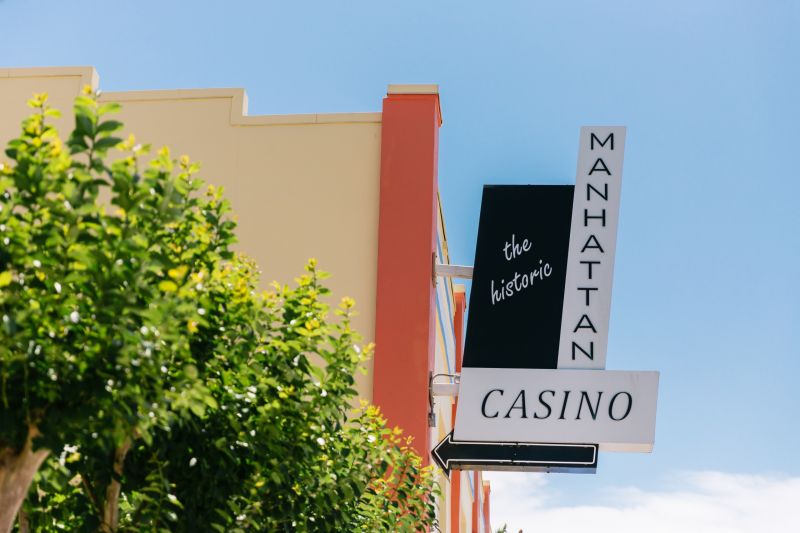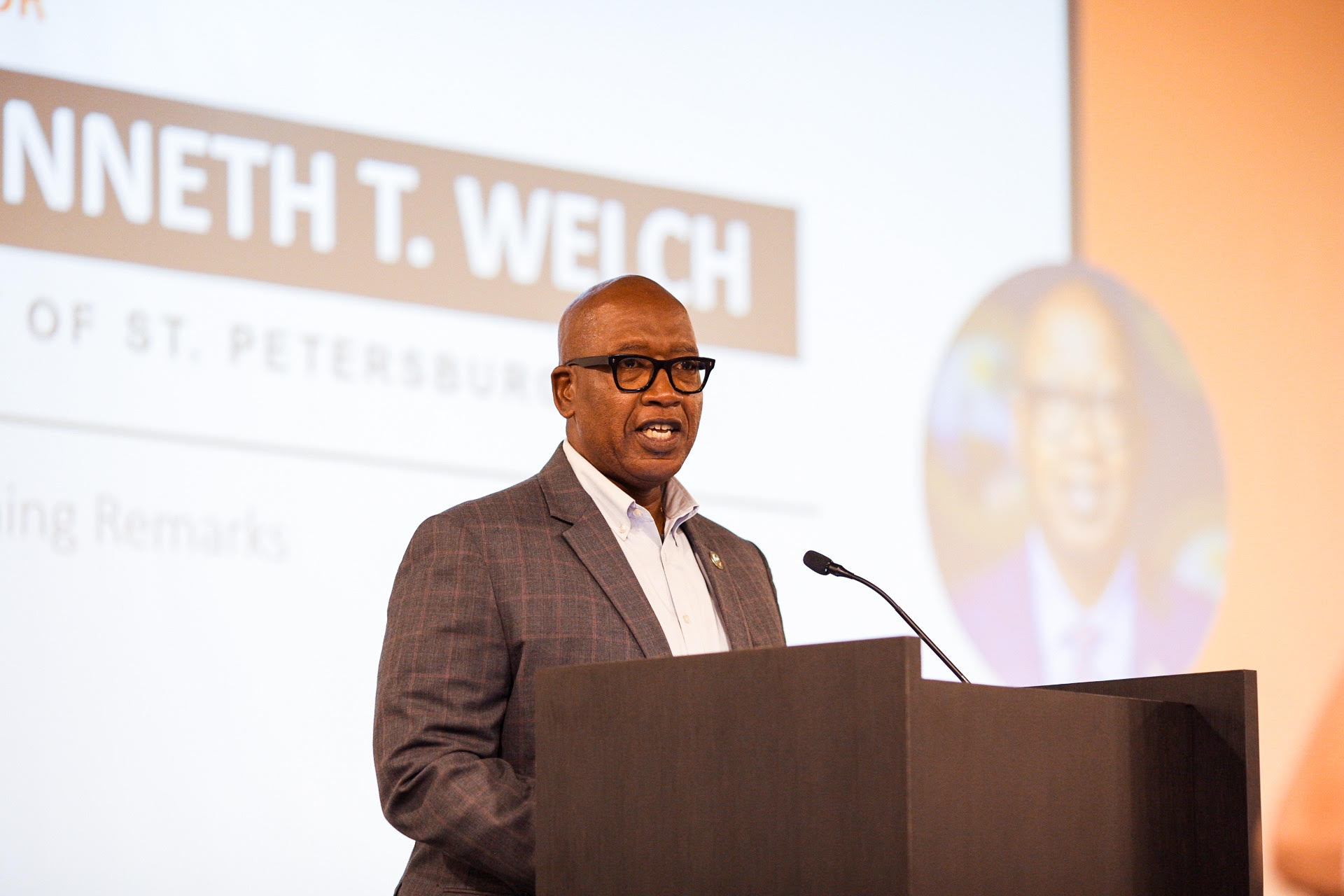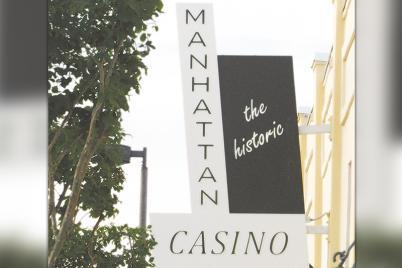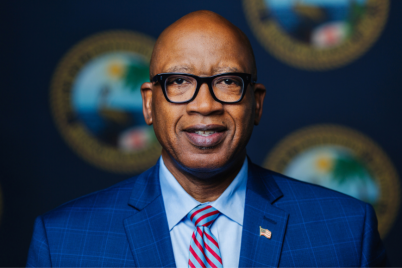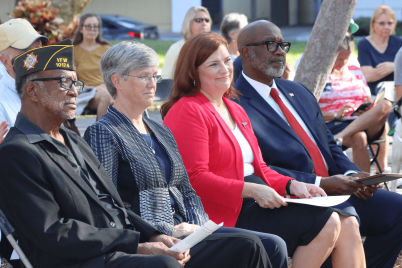Councilmember John Muhammad said rumors and suspicions of backdoor deals and courting outside investors would be put to rest if the city and the Urban Collective could sit down and have a productive conversation.
BY FRANK DROUZAS, Staff Writer
ST. PETERSBURG — As a response to the city’s community conversation on the Manhattan Casino held on Nov. 1, the Urban Collective, who currently has the lease on the building until Nov. 30, held a meeting at the Manhattan Casino on Nov. 9 to hear the voices of the community concerning the historic landmark’s present and future.
After repeatedly hearing that the Manhattan Casino was to close its doors, the Urban Collective, a coalition of seven successful business owners, believed they had to act to preserve one of St. Pete’s most storied locations. They purchased the lease from the Callaloo Group last year when they took over the facility.
“We all thought that we needed to save this place,” said Trevor Mallory, a member of the Urban Collective.
As many restaurants and establishments closed due to the pandemic, the group didn’t want that to happen to the Manhattan, he said.

The Urban Collective was formed by a group that regularly met downtown to discuss local politics. Seven of them — Jabaar Edmond, LaShante Keys, Trevor Mallory, Jason Bryant, Dan Soronen, Tamisha Darling-Roberson and Ella K. Coffee — decided to take on the enormous challenge of managing the Manhattan.
“So, we invested right here into our own community with our own personal money,” Mallory said, adding that the group didn’t expect any financial return within the first 24 to 36 months.
Though the Urban Collective had discussed some options with the city, the group wanted to hear directly from the community about what directions the Casino should take. The group’s vision is “to serve as an economic and social beacon for the Deuces community while establishing a forward-looking legacy for the historic Manhattan Casino.”
The initial lease between Callaloo and the city expires soon, Mallory said, and explained that the building currently needs core repairs and maintenance; it has convoluted ownership, capitalization and operating structure and needs additional resources to sustain operations and execute on its next phase of transformation.
“When we look out our window, we see empty lots, we see gated up lots with construction, debris, and tractors and all that stuff,” Mallory said, “but what we don’t see are other businesses, we don’t see homes, we don’t see the foot traffic, we don’t see anything that drives opportunity to this area.”
There is also the need to improve operational revenues and expense management after changing the operating model earlier this year, he said.
The Urban Collective hopes to revitalize the Manhattan through a partnership with the city. The group’s recommendations include the following:
- Reorganizing ownership
- Capitalization and operating structure
- Securing additional funding through public and private sources
- Building an experienced leadership and operations team
- Creating goals with clear objectives, milestones and metrics around sales, services and operational efficiencies.
The group also wants to establish four distinct profit centers around the event hall, supper club, bistro/cafe and gallery and allow the city to perform required maintenance and repairs to the facility.
Ultimately, the group aims to present the city with a detailed business plan and roadmap that aligns with the city’s Deuces Live and Warehouse Arts District strategic vision and plan and build awareness around a new brand, vision, and slogan: Manhattan 22–The Legacy Forward.
Another member of Urban Collective, Jabaar Edmond, believes the Manhattan has gotten the short end of the stick from the city, as they have evaded any direct, open conversations concerning its future.
“At the end of this agreement on Nov. 30, we will ask for an RFP; we will try to be a part of the future of the Manhattan Casino,” he said.
Any hopes of partnering with the city dimmed during the Nov. 10 city council meeting.
“We need to make a decision on this going forward,” Welch said and noted that he and his staff have spoken with members of Urban Collective about a path forward for the Casino.
The mayor expressed his disappointment and frustration in dealing with the group, saying that the Urban Collective took “weeks, if not months,” to get him the bank statements and basic financial information he’d asked for. Welch also stressed that he understood that they could pay the past-due rent on the facility, which now stands at over $98,000.
“The rent has not been paid,” he said. “It has not been paid the entire time I have been in office.”
The mayor said he was open to creative ways to reduce the amount owed, as the lease with the Callaloo Group expires on Nov. 30.
“Given the current status of the rent owed, the lack of communication and collaboration, I cannot justify an extension,” the mayor said. “Equitable economic development is a priority, and it’s a pillar of my administration, but that does not mean that anything goes. The rules still matter.”
He underscored the need for on-time lease payments, maintenance and responsiveness to valid requests for reports and information. The initial agreement concerning the Manhattan Casino in 2017 was between the city and the Callaloo Group, but when Urban Collective joined with Callaloo in 2021, they assumed all of the responsibilities that are in that agreement, Welch said.
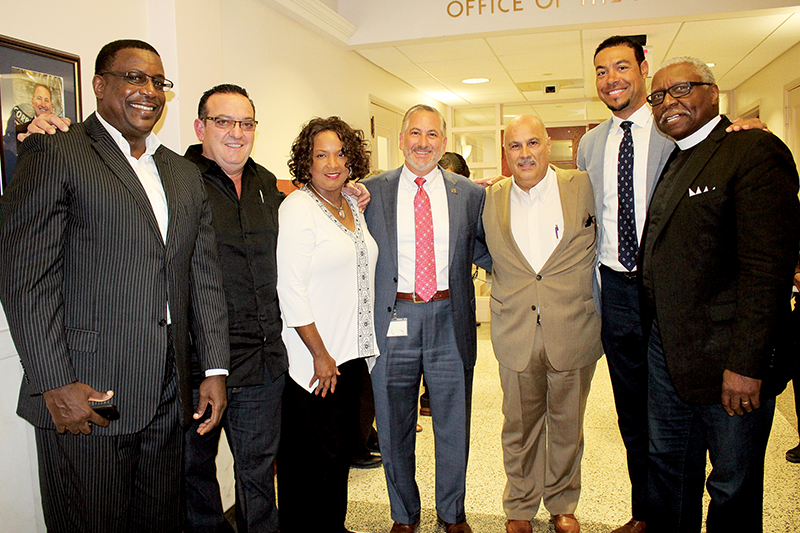
The original lease was between the city and the Callaloo Group. Some members of the Callaloo group are seen here after being awarded the lease at the Nov. 20, 2017, city council meeting. L-R, Pastor G. Gregg Murray, Ramon Hernandez, Deborah Figgs-Sanders, Mayor Rick Kriseman, Mario Farias, Vincent Jackson and Pastor Basha Jordan, Jr.
“The city did not put the Urban Collective in that position,” he pointed out. “They chose to take that risk, and I give them credit for wanting to make a difference. But they took on that liability, and because of that business decision to join Callaloo and assume those liabilities, well, that has consequences that the city is not responsible for.”
The city has been patient and has explored every feasible option to bring this matter to a mutually acceptable conclusion, Welch said, but extending the lease beyond Nov. 30 does make “business or practical sense,” and he will not support it. He noted that the restaurant business model is clearly not working, “nor did it for previous restaurants at the location.”
Mayor Welch referenced the community conversation concerning the future of the Manhattan, and said it aimed to discern what the most impactful and successful use of that facility would be. More than 200 people—in person and virtually—gave their opinions on what the future of the Manhattan Casino should look like.
“I know this historic landmark evokes emotions in so many in the community, and rightfully so,” he said. “I grew up on the Deuces and 16th Street as well. We all want the same thing: to ensure the legacy of the Manhattan Casino remains a source of pride and provides community impact for generations.”
City Development Administrator Joe Zeoli said that during a city council meeting in March, the city was open to amending the agreement for the remainder of the lease term but not extending it beyond Nov. 30. Discussions between Callaloo continued from March through August.
“It’s important to note that to date, Callaloo has really not provided the requested information for us to create the proposed amendment,” Zeoli said. “That’s been a frustration point for city staff, and I’m sure for Urban Collective as well.”
At the city council meeting, Mallory disagreed with the mayor, as he pointed out that the restaurant at the Manhattan Casino is actually successful but stressed the dire need for repairs to the facility.
“The restaurant right now is the only thing there that’s paying the basic bills to keep our employees paid and to keep the restaurant running,” he said. “The problem is that we have a 6,000-square foot event space that we cannot utilize, which is 85 percent of our revenue because we have no AC. We haven’t had AC in seven months in that building.”
Mallory insisted that these issues — including a hole in the roof that allows flooding when it rains — have been shared with the city for months, and they should not be surprised now. The facility has lost money on being unable to rent the event space due to these poor conditions, and “rent can’t be paid if you can’t earn the money,” he said.
“The only reason we couldn’t make the money is because our facility is not 100 percent operable,” he said. “It’s the city’s building; how do they not handle that?”
Councilmember Gina Driscoll urged the Urban Collective and the city to work together and find a solution, as the Manhattan Casino is too valuable for St. Pete to devolve into disuse.
“We have a historic city-owned asset with holes in the roof, and the AC doesn’t work, so what do you think is happening to that building right now,” she asked. “We have to stay on top of that. I don’t care who pays for it at this point.”
Driscoll underscored that the facility is starting to hit its stride once again and deserves to be saved, not shut down.
“What you see now is people making that their regular spot,” she said. “You see people gathering there; you see specific themed events, poetry readings. If you see how people are enjoying that space now, it’s what many of us dreamed could happen there, and they’re just on the cusp of getting into a successful flow, and we’re going to kick them out, and that’s frustrating.
I’ll tell you it’s the most exciting thing happening on the Deuces right now, and we’re about to shut it down indefinitely. I didn’t want that to happen with that at least speaking up and saying that I think there’s a better way.”
Both St. Petersburg City Council Vice Chair Brandi Gabbard and Council Chair Driscoll suggested using the South St. Petersburg Community Redevelopment Area (CRA) funds to help keep the Manhattan Casino’s doors open.
“Isn’t this like a great example of what the CRA was created for and what that funding is for? And not to mention, we just rolled over $17 million that wasn’t used last fiscal year in the South St. Pete CRA. We can’t be asking ourselves why isn’t anything happening when we’re keeping the money in the bank; we got to get it out on the street.
Sherry Howard, who grew up in St. Pete and has fond memories of the 22nd Street corridor, is hopeful for the Manhattan Casino’s future.
“My request is that the city council make a fair and equitable decision in favor of the Urban Collective with a continuation of the operation and management of what should be designated as a historical landmark but is not,” she said.
Carla Bristol, owner of Gallerie 909, agreed that the city should keep working with the Urban Collective to do what it can to revitalize the facility.
“This is just too important to this community,” she said. “I feel that we owe it to these young people who took the time, the money, and decided to take a chance on supporting what’s right for our community.”
After impassioned pleas from community members, Mayor Welch said his position has not changed and that he will not govern based on fear or rumors.
The next city community conversation has yet to be announced.

